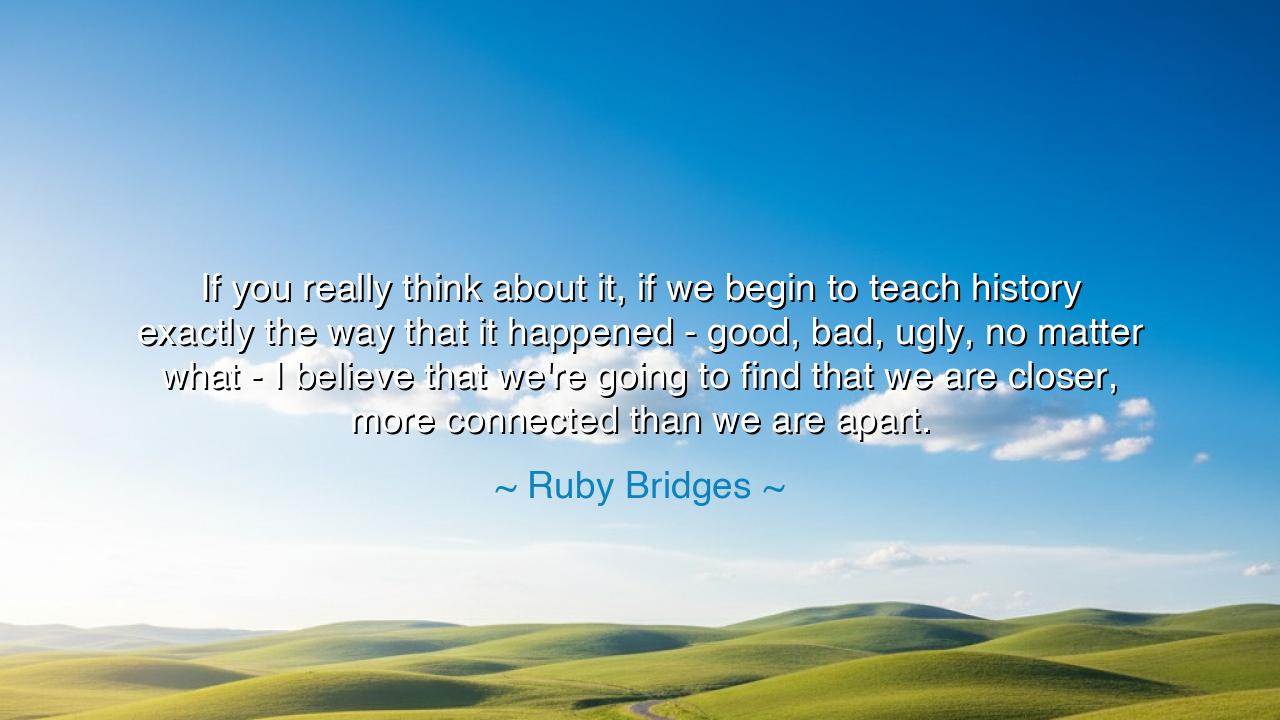
If you really think about it, if we begin to teach history
If you really think about it, if we begin to teach history exactly the way that it happened - good, bad, ugly, no matter what - I believe that we're going to find that we are closer, more connected than we are apart.






“If you really think about it, if we begin to teach history exactly the way that it happened — good, bad, ugly, no matter what — I believe that we're going to find that we are closer, more connected than we are apart.” — Ruby Bridges
Listen, O children of the new dawn, to the words of Ruby Bridges, a woman whose name is carved not in marble, but in the living heart of courage. When she speaks of history, she speaks not as a scholar alone, but as one who lived within its pages — a child who walked, small yet unshaken, through a storm of hate, carrying with her the future of a nation. Her words are not mere reflection; they are a call to truth. For she knows that only by confronting the good, the bad, and the ugly of our past can we ever hope to heal the divisions that shadow our present.
The origin of this saying flows from the river of Ruby’s own life. In 1960, at just six years old, she became the first African-American child to attend an all-white elementary school in New Orleans. Each morning, flanked by federal marshals, she walked through crowds who hurled curses and threats, though she was but a child holding a lunchbox. Yet within that young heart burned a quiet understanding — that her walk was not only her own. It was the crossing of a bridge between two worlds long divided by fear. And though she did not yet have the words, she was already teaching the lesson she would later speak: that truth, when faced bravely, connects rather than divides.
When Ruby Bridges says we must teach history exactly as it happened, she speaks against the temptation of selective memory. Too often do nations tell their stories as if they were always noble, as if cruelty and injustice were strangers to their land. But the ancients knew that truth unspoken is a wound unhealed. To hide the darkness of the past is not to protect the young, but to chain them to ignorance. True history, she reminds us, must be complete — the triumphs and the tragedies, the heroes and the wrongdoers alike — for only in seeing the whole can we understand the heart of humanity.
And yet, there is a profound hope within her words. Ruby does not call for history to divide us, but to reunite us. She believes that if we gaze honestly upon the past, we will see not strangers, but reflections of ourselves — people flawed and striving, broken and beautiful, capable of cruelty but also of grace. For when we strip away the lies that keep us apart, we find that our stories intertwine like roots beneath the soil. The suffering of one people is bound to the silence of another, and the victories of justice belong not to one race or creed, but to all who dare to stand for what is right.
Think upon the example of Germany after the Second World War. Faced with the horrors of its own making, the nation did not turn away but looked steadily into the abyss of its past. In doing so, it rebuilt itself upon remembrance, not denial. Monuments were not raised to glory, but to grief — reminders that truth, however painful, is sacred. This is the spirit that Ruby Bridges calls us to: not self-condemnation, but honest remembrance, so that from the ashes of error may rise the architecture of understanding.
Her wisdom is thus both moral and prophetic. She teaches that truth is the path to unity. Lies divide because they isolate us from one another; truth binds, because it reveals the shared humanity behind every wound. When history is told fully — when every voice is heard — compassion awakens. The child of privilege begins to see the pain behind the progress; the child of struggle begins to see the courage that endures within suffering. The wall between “us” and “them” begins to crumble, and what remains is we — the eternal family of humankind.
So take this teaching into your heart: Do not fear the truth. Whether it is the truth of your nation, your people, or your own soul, face it whole — good, bad, and ugly. Teach your children not to inherit a myth, but to inherit wisdom. Speak honestly of the past, that they may build rightly in the future. For as Ruby Bridges declares, when we teach history as it truly happened, we do not widen the wounds — we begin to heal them. And when we see clearly, we will know at last that we are not enemies, but kin — closer, more connected than we are apart.






AAdministratorAdministrator
Welcome, honored guests. Please leave a comment, we will respond soon